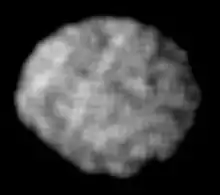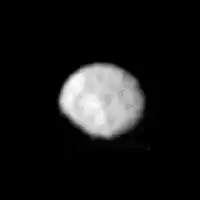لاریسا (قمر)
لاریسا (/ləˈrɪsə/ lə-RISS-ə; Greek: Λάρισα) (به انگلیسی: Larissa) نام یکی از قمرهای سیاره نپتون میباشد که ۱۹۲ کیلومتر قطر دارد و در فاصله ۷۳۵۰۰ کیلومتری سیاره نپتون به دور آن میچرخد.
 Larissa from وویجر ۲ | |
| کشف | |
|---|---|
| کاشف | Harold J. Reitsema, William B. Hubbard, Larry A. Lebofsky, and دیوید جی ثولن |
| تاریخ کشف | May 24, 1981 |
| خواص مداری[1] | |
| مبدأ 18 August 1989 | |
| نیمقطر بزرگ | 73 548 ± 1 km |
| خروج از مرکز مداری | 0.001393 ± 0.00008 |
| دوره تناوب مداری | 0.55465332 ± 0.00000001 d |
| زاویه انحراف |
|
| قمر | نپتون |
| مشخصات فیزیکی | |
| ابعاد | 216×204×168 km (± ~10 km)[2][3] |
| شعاع متوسط | 97 ± 3 km[4] |
| حجم | ~3.5×۱۰۶متر مکعب |
| جرم (فیزیک) | ~4.2×۱۰۱۸ kg (estimate)[lower-alpha 1] |
| چگالی متوسط | ~1.2 g/cm³ (estimate)[4] |
| گرانش سطحی | ~0.03 شتاب[lower-alpha 2] |
| سرعت گریز | ~0.076 km/s[lower-alpha 3] |
| دوره چرخش | قفل جزر و مدی |
| انحراف محوری | zero |
| سپیدایی | 0.09[2][4] |
| دما | ~51 کلوین mean (estimate) |
| قدر ظاهری | 21.5[4] |
این قمر در سال ۱۹۸۹ به صورت تصادفی توسط کاوشگر فضایی ویجر ۲ کشف شده است.

منابع
- Jacobson, R. A.; Owen, W. M., Jr. (2004). "The orbits of the inner Neptunian satellites from Voyager, Earthbased, and Hubble Space Telescope observations". Astronomical Journal. 128 (3): 1412–1417. Bibcode:2004AJ....128.1412J. doi:10.1086/423037.
- Karkoschka, Erich (2003). "Sizes, shapes, and albedos of the inner satellites of Neptune". Icarus. 162 (2): 400–407. Bibcode:2003Icar..162..400K. doi:10.1016/S0019-1035(03)00002-2.
- Williams, Dr. David R. (2008-01-22). "Neptunian Satellite Fact Sheet". NASA (National Space Science Data Center). Retrieved 2008-12-13.
- "Planetary Satellite Physical Parameters". JPL (Solar System Dynamics). 2010-10-18. Retrieved 2011-10-11.
- Stooke, Philip J. (1994). "The surfaces of Larissa and Proteus". Earth, Moon, and Planets. 65 (1): 31–54. Bibcode:1994EM&P...65...31S. doi:10.1007/BF00572198.
- مشارکتکنندگان ویکیپدیا. «Larissa (moon)». در دانشنامهٔ ویکیپدیای انگلیسی، بازبینیشده در ۲۶ سپتامبر ۲۰۱۴.
- http://www.haftaseman.ir/webdb/article.asp?id=447. پارامتر
|عنوان= یا |title=ناموجود یا خالی (کمک)
- The mass estimate is based on the assumed density of 1.2 g/cm³, and a volume of 3.5 ×۱۰۶ km³ obtained from a detailed shape model in Stooke (1994).[5]
This article is issued from Wikipedia. The text is licensed under Creative Commons - Attribution - Sharealike. Additional terms may apply for the media files.
